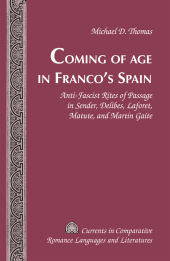 Neuerscheinungen 2014Stand: 2020-02-01 |
Schnellsuche
ISBN/Stichwort/Autor
|
Herderstraße 10
10625 Berlin
Tel.: 030 315 714 16
Fax 030 315 714 14
info@buchspektrum.de |

Michael D. Thomas
Coming of Age in Franco´s Spain
Anti-Fascist Rites of Passage in Sender, Delibes, Laforet, Matute, and Martín Gaite
Neuausg. 2014. X, 133 S. 230 mm
Verlag/Jahr: PETER LANG, PIETERLEN 2014
ISBN: 1-433-12453-X (143312453X)
Neue ISBN: 978-1-433-12453-2 (9781433124532)
Preis und Lieferzeit: Bitte klicken
Coming of Age in Franco´s Spain studies the social and psychological damage of the aftermath of the Spanish Civil War and identifies an aesthetic of resistance, a portrayal of emerging adults who rebel with courage and caring that even more mature adults do not show.
How could authors not write about the effects of a civil war that tore their nation in two, that divided and destroyed families and friends? They had to tell the story, though they were carefully scrutinized and censored. How could they resist artistically and present alternate voices and visions for the future? Writing is resistance, remembering is resistance. Writing is remembering and selecting those memories that, in these authors´ view, have intense significance in the formation of the self. Sender, Delibes, Laforet, Matute, and Martín Gaite have left a legacy of confrontation and hope. Coming of Age in Franco´s Spain studies the social and psychological damage of the aftermath of the Spanish Civil War and identifies an aesthetic of resistance, a portrayal of emerging adults who rebel with courage and caring that even more mature adults do not show. Whereas the Fascists engaged in the process of "othering", considering certain groups to be enemies, sub-human, deserving death, meriting bondage in slavery, these novels describe protagonists who learn to reach out to "the other". They advocate treatment of the marginalized and persecuted in a manner diametrically opposed to the policies and practices of the Franco Regime. The positive message conveyed is that the human spirit was not completely crushed by the Fascists´ mandate to make all Spanish citizens conform to the Regime´s own "values", but these authors advocate authenticity, creative freedom, universal values, all alive and well, even in the darkest of times; they crafted a blueprint for hope through complexities of the narrative art.
Michael D. Thomas received his PhD at the University of Kansas. He has taught at the University of Houston and is currently professor of Spanish and director, Division of Spanish and Portuguese, Baylor University, Waco, Texas. Thomas has done post-doctoral study at Dartmouth, Yale, and the Sorbonne. In 1990, he was named a ®Piper Professor¯ by the Piper Foundation, San Antonio, Texas. In 2001, he published a textbook, De Viva Voz! with McGraw-Hill. He has published extensively on Spanish post-civil war authors, and in addition on Lorca´s theater, the Cantar de mio Cid, Don Quijote de la Mancha, Pepita Jiménez, and San Manuel Bueno, Mártir. His scholarship has appeared in Symposium, Hispania, Romance Quarterly, La corónica, Cauce, Revista de Estudios Hispánicos, Anales de la literatura espa¤ola contemporánea, and others.


